10 BULLS - KAKUAN
Read one of the most beautiful and most significant Zen story.
Transcribed by Nyogen Sensaki and Paul Reps - Illustrated by Tomikichiro Tokuriki
The bull is the eternal principle of life, truth in action. The ten bulls represent sequent steps in the realization of one's true nature. This sequence is as potent today as it was when Kakuan (1100-1200) developed it from earlier works and made his paintings of the bull.
Taken from the book: Zen Flesh, Zen bones compiled by Paul Reps, Anchor books, NY
1. The Search for the Bull
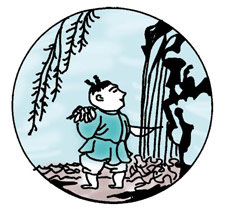
In the pasture of this world, I endlessly push aside the tall grasses in search of the bull. Following unnamed rivers, lost upon the interpenetrating paths of distant mountains, My strength failing and my vitality exhausted, I cannot find the bull. I only hear the locusts chirring through the forest at night
Comment: The bull never has been lost. What need is there to search? Only because of separation from my true nature, I fail to find him. In the confusion of the senses I lose even his tracks. Far from home, I see many cross-roads, but which way is the right one I know not. Greed and fear, good and bad, entangle me.
2. Discovering the Footprints
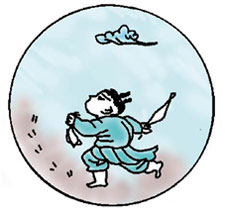
Along the riverbank under the trees, I discover footprints! Even under the fragrant grass I see his prints. Deep in remote mountains they are found. These traces no more can be hidden than one's nose, looking heavenward.
Comment: Understanding the teaching, I see the footprints of the bull. Then I learn that, just as many utensils are made from one metal, so too are myriad entities made of the fabric of self. Unless I discriminate, how will I perceive the true from the untrue? Not yet having entered the gate, nevertheless I have discerned the path.
3. Perceiving the Bull
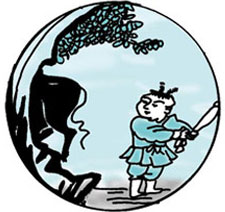
I hear the song of the nightingale. The sun is warm, the wind is mild, willows are green along the shore,
Here no bull can hide! What artist can draw that massive head, those majestic horns?
Comment: When one hears the voice, one can sense its source. As soon as the six senses merge, the gate is entered. Wherever one enters one sees the head of the bull! This unity is like salt in water, like colour in dyestuff. The slightest thing is not apart from self.
4. Catching the Bull
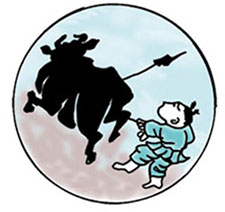
I seize him with a terrific struggle. His great will and power are inexhaustible. He charges to the high plateau far above the cloud-mists, Or in an impenetrable ravine he stands.
Comment: He dwelt in the forest a long time, but I caught him today! Infatuation for scenery interferes with his direction. Longing for sweeter grass, he wanders away. His mind still is stubborn and unbridled. If I wish him to submit, I must raise my whip.
5. Taming the Bull
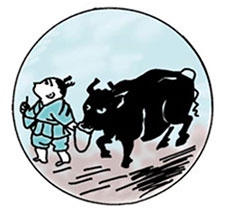
The whip and rope are necessary, Else he might stray off down some dusty road. Being well trained, he becomes naturally gentle. Then, unfettered, he obeys his master.
Comment: When one thought arises, another thought follows. When the first thought springs from enlightenment, all subsequent thoughts are true. Through delusion, one makes everything untrue. Delusion is not caused by objectivity; it is the result of subjectivity. Hold the nose-ring tight and do not allow even a doubt.
6. Riding the Bull Home
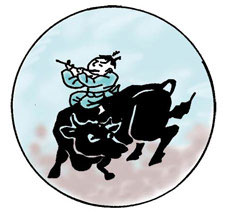
Mounting the bull, slowly I return homeward. The voice of my flute intones through the evening. Measuring with hand-beats the pulsating harmony,
I direct the endless rhythm. Whoever hears this melody will join me.
Comment: This struggle is over; gain and loss are assimilated. I sing the song of the village woodsman, and play the tunes of the children. Astride the bull, I observe the clouds above. Onward I go, no matter who may wish to call me back.
7. The Bull Transcended
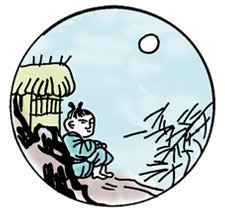
Astride the bull, I reach home. I am serene. The bull too can rest. The dawn has come. In blissful repose,
Within my thatched dwelling I have abandoned the whip and rope.
Comment: All is one law, not two. We only make the bull a temporary subject. It is as the relation of rabbit and trap, of fish and net. It is as gold and dross, or the moon emerging from a cloud. One path of clear light travels on throughout endless time.
8. Both Bull and Self Transcended

Whip, rope, person, and bull -- all merge in No-Thing. This heaven is so vast no message can stain it. How may a snowflake exist in a raging fire?
Here are the footprints of the patriarchs.
Comment: Mediocrity is gone. Mind is clear of limitation. I seek no state of enlightenment. Neither do I remain where no enlightenment exists. Since I linger in neither condition, eyes cannot see me. If hundreds of birds strew my path with flowers, such praise would be meaningless.
9. Reaching the Source
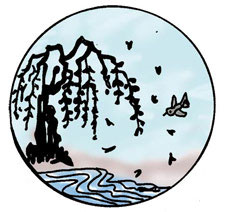
Too many steps have been taken returning to the root and the source. Better to have been blind and deaf from the beginning! Dwelling in one's true abode, unconcerned with that without -- The river flows tranquilly on and the flowers are red.
Comment: From the beginning, truth is clear. Poised in silence, I observe the forms of integration and disintegration. One who is not attached to "form" need not be "reformed." The water is emerald, the mountain is indigo, and I see that which is creating and that which is destroying.
10. In the World
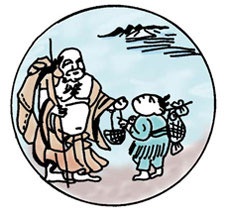
Barefooted and naked of breast, I mingle with the people of the world. My clothes are ragged and dust-laden, and I am ever blissful. I use no magic to extend my life; Now, before me, the dead trees become alive.
Comment: Inside my gate, a thousand sages do not know me. The beauty of my garden is invisible. Why should one search for the footprints of the patriarchs? I go to the market place with my wine bottle and return home with my staff. I visit the wineshop and the market, and everyone I look upon becomes enlightened.

A video of Kennin-ji, a Zen temple in Kyoto, Japan. Visit made on September 11, 2018.
Kennin-ji is the oldest zen temple in Kyoto. It has been founded by Yousai in 1202. Kennin-ji belongs to the Zen Rinzai tradition. Yousai brought tea seeds back from China, and popularized the practice of drinking green tea. He is recognized as the founder of the tea ceremony.
ZEN STORIES
Yoshi sat under the cherry blossom tree, watching the petals dance in the breeze. Though the day was beautiful, a frown creased his brow.
“Sensei,” he said as his teacher approached,
“I have achieved all you have asked. I have meditated, walked the eightfold path, and found my dharma. Yet one thing eludes me — how to be happy.”
Sensei smiled kindly, stroking his wispy beard.
“Happiness, like sunlight, cannot be grasped directly. It is only reflected.”
Yoshi’s frown deepened.
“Please Sensei, speak plainly.”
Sensei settled on the ground beside Yoshi.
“Of course. Let me tell you a story.”
“Once upon a time, there was a monk who found a magnificent lamp. When he rubbed it, a genie emerged in a puff of smoke.
‘I will grant you three wishes,’ said the genie. The monk thought carefully before replying. For his first wish, he asked for an end to all suffering in the world. The genie sadly shook his head.
‘That, I cannot do. Please ask for something else.’
The monk understood he had been too ambitious. For his second wish, he asked for an end to hunger in his village. Again, the genie shook his head.
‘That too is beyond my power. You have one wish left.’
By now the monk had learned his lesson. For his final wish, he said, ‘I wish to always be content.’
The genie smiled broadly. ‘Your wish is granted!’ And with that, the genie disappeared in a puff of smoke, leaving the monk’s lamp just as before.”
Sensei paused, letting his story sink in. Yoshi furrowed his brow.
“But Sensei, how does this help me find happiness?”
Sensei explained.
“Like the monk, you cannot force happiness through wishes or demands. It comes from within. Happiness is granted to those who learn to be content with what they have in each moment.”
Yoshi’s eyes widened in understanding. He smiled up at the dancing petals, swaying in the serene breeze. For the first time, he noticed their astonishing beauty.
“One more thing, Yoshi,” said Sensei, eyes twinkling.
“Cut back on the hair gel. The spikes are a bit much.”
hey both laughed long and hard, their chuckles joining the whisper of wind through the cherry trees.
Noticing that his father was growing old, the son of a burglar asked his father to teach him the trade so that he could carry on the family business after his father had retired.
The father agreed, and that night they broke into a house together.
Opening a large chest the father told his son to go in and pick out the clothing. As soon as the boy was inside, the father locked the chest and then made a lot of noise so that the whole house was aroused. Then he slipped quietly away.
Locked inside the chest the boy was angry, terrified, and puzzled as to how he was going to get out. Then an idea flashed to him- he made a noise like a cat. The family told a maid to take a candle and examine the chest. When the lid was unlocked the boy jumped out, blew the candle, pushed his way past the astonished maid, and ran out. The people ran after him. Noticing a well by the side of the road the boy threw in a large stone, then hid in the darkness. The pursuers gathered around the well trying to see the burglar drowning himself.
When the boy got home he was very angry at his father and he tried to tell him the story; but the father said: 'Don't bother to tell me the details, you are here- you have learned the art.'
During the civil wars in feudal Japan, an invading army would quickly sweep into a town and take control. In one particular village, everyone fled just before the army arrived - everyone except the Zen master.
Curious about this old fellow, the general went to the temple to see for himself what kind of man this master was. When he wasn't treated with the deference and submissiveness to which he was accustomed, the general burst into anger.
"You fool," he shouted as he reached for his sword, "don't you realize you are standing before a man who could run you through without blinking an eye!"
But despite the threat, the master seemed unmoved.
"And do you realize," the master replied calmly, "that you are standing before a man who can be run through without blinking an eye?"
A distraught man approached the Zen master.
"Please, Master, I feel lost, desperate. I don't know who I am. Please, show me my true self!"
But the teacher just looked away without responding.
The man began to plead and beg, but still the master gave no reply.
Finally giving up in frustration, the man turned to leave.
At that moment the master called out to him by name.
"Yes!" the man said as he spun back around.
"There it is!" exclaimed the master.
* * * * * * * *
See our List of Timeless Books on Meditation and Wisdom
Poems and Photos by Shantidharm:
Autumn - Sunsets - Mountains - Ocean - Lakes - Japan - Flowers